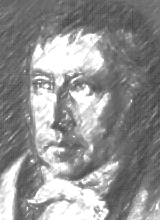©2000 Donna Brown & E. G. Rozycki
The Educational Theory of Hegel
RETURN
Edited 8/18/11
I. Theory of Value:
Education is information. The general object of education is to get knowledge. (B270) Education is development. We make a new start on the inside (from the Ego) to (the true Self) from the outside which asserts its right and takes the initiative. (B271) Education is institutional. Education must now realize itself in an Institution whose chief object is to train to an institutional life. (B272)
II. Theory of Knowledge:
Knowledge involves the real distinction of object and subject. (B142) Truth does not lie in the immediate data furnished by perception, but that universally the truth of any object involves mediation. An object is before me, and for the certainty of this I have the vouching of the senses.(B86) I simply possess the assurance: the object is. I, this particular consciousness, become sensible of this individual object. (B87)
Belief: not the factors (subject and object) of knowledge or consciousness are known, but only their contact should assume the form of consciousness, and known to itself or to us. (B143)
Mistake: Metaphysical thinking is an attempt to deduce the true nature of things from our concepts of them. (B367) The errors of evolutionism in its confessedly metaphysical forms are more glaring, it true, than those of materialistic evolutionism. (B368)
The system of all science must germinate in the absolutely thought and existence are ultimately based. (B95) Hegel evolves all things from pure Being. (B368) Pure being is identical to pure naught. (B95) Origination is the unity of being and naught. Existence contains both being and naught. Taking being and naught according to their difference, each exists as a unity with the other. Something is; it, moreover, exists and includes the process of origination. (B96) The quality of every existing thing which constitutes its limit determines the thing and makes it finite. The nature of finite things is to contain the germ of destruction as their inmost being; "the hour of their birth is the hour of their death." (B98)
Children and students of all kinds needed most of all to learn to conform to institutional order and the laws of reason, since only through such means could they be truly free. Only in response to order could they relate to others significantly and hence define themselves. Only through order and orderly institutions could they become part of the community which extended out from the local scene to the world scene. (B268)
The School of the World, then, we have before us; but who is the teacher? Ultimately the World-Spirit, the absolute Ego who is at the center of civilization and is unfolding it into a colossal image of himself. Undoubtedly there are many other teachers, every grade in fact; but the World-Spirit is the chief pedagogue in the World-School. (B274) Still interpretation is needed, the World-Spirit uttering at first in the events of the time must have a new utterance in Art, Literature, Science. Hence the new teacher appears, the interpreter of the World-Spirit as artist, poet, thinker. ( B275 )
The community is the primordial unit or cell out of which Society is evolved. The public school is often called the Common School, being common to all as an Educative Institution, teaching the common branches, common to the community and necessary for social intercommunication. It takes the undeveloped self of the child and unfolds it out of the Family into the community, the school being itself a community. (B269)
Education is made actual in its Institution, is organized, endowed with a body as it were, otherwise is simply an idea and subjective, belonging to the few or even to the one, is imparted to all. Hence it is often said that Education, or rather its embodiment in the Public School, is the saving principle of popular government which depends upon the intelligence of the people. (B270)
If then the world, as an intelligible world of distinction, differentiation, individuality, it is equally true that in it, as an intelligible world, there are no absolute separations or oppositions, no antagonisms which cannot be reconciled. All difference presupposes a unity, and is itself is an expression of that unity; and we let it expand and develop itself to the utmost, yet ultimately it must exhaust itself, and return into the unity. (A136)
Citations
A. Caird, E. (1968). Hege1. U.S: Archon Books.
B. Goetzman, W. (1973). The American Hegelians. New York: Alfred A. Knopf, Inc.
C. Kaufmann, W. (1965). Hegel A Reinterpretation. New York: Anchor Books,
TO TOP

